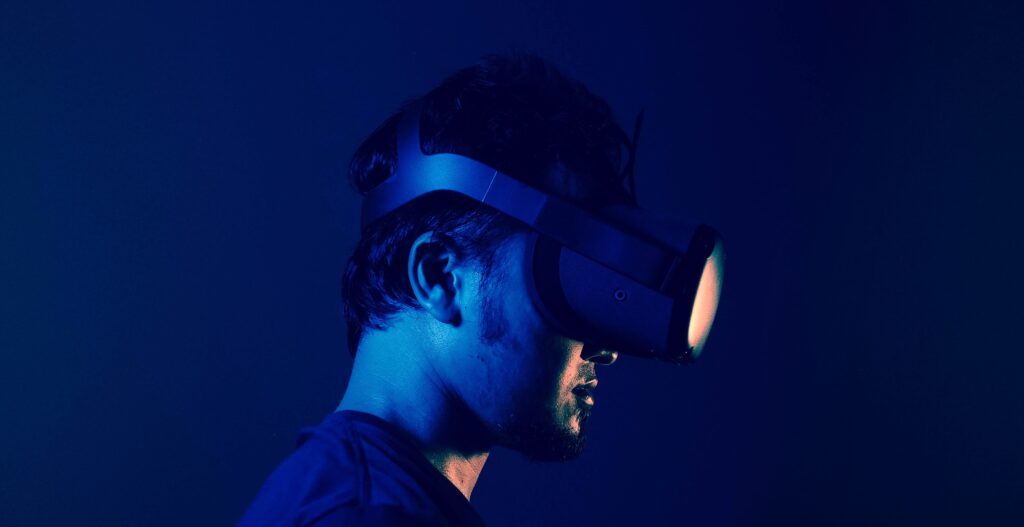Virtual reality, a technology that immerses users into an artificially constructed environment, is swiftly becoming the vanguard of change in the entertainment industry. Traditionally grounded in television, movies, music, and games, this industry is undergoing a significant shift towards more immersive, engaging, and personalized experiences.
Amidst this transformative landscape, VR game development services stand out, providing the technical expertise and creative prowess to build interactive virtual worlds that captivate audiences. These services are not merely adding another dimension to the industry; they are fundamentally rewriting the rules, setting the stage for an unprecedented evolution in how we perceive and interact with entertainment.

VR Impact on Various Segments of the Entertainment Industry
Video Games
The advent of VR has had a substantial impact on the gaming sector of the entertainment industry. First, it has enhanced immersion and interactivity, transforming gaming from a passive activity to a deeply engaging experience. Gamers are no longer mere observers but become active participants within game worlds.
Secondly, VR introduces novel gameplay possibilities, revolutionizing game design, and narrative structures. Thirdly, VR has stimulated the rise of a new competitive scene, VR esports. This new arena provides a fully immersive competitive environment, bringing physicality into digital competition and making esports even more thrilling and spectator-friendly.
Movies and TV
VR is revolutionizing the domain of filmmaking and TV by offering immersive cinematic experiences that transport viewers right into the heart of the action. The sense of presence this creates significantly enhances emotional engagement with the narrative.
Additionally, VR facilitates interactive storytelling, where viewers can influence the narrative direction, resulting in a customized viewing experience that is far more immersive than traditional linear narratives. By actively participating in the storyline, audiences form a deeper connection with the content, fostering a sense of ownership over their viewing experience. The impact of VR in this sector is profound, dramatically altering how we consume media.
Music and Concerts
In the music industry, VR has paved the way for innovative experiences such as virtual concerts. Fans can now experience live performances from anywhere in the world, feeling like they’re in the front row, making the music scene more accessible than ever.
VR also offers immersive music games where players can create, mix, and experience music in entirely new ways, such as virtually playing instruments or DJing in realistic environments. These advancements have not only diversified the music landscape but have also brought a fresh wave of interaction and immersion, reshaping the way we engage with music.
Theme Parks
The introduction of VR technology has significantly impacted the theme park industry by enhancing rides and attractions. With VR, traditional rides are transformed into dynamic, immersive adventures.
Patrons don VR headsets and find themselves plunging into the ocean’s depths, soaring through outer space, or navigating fantasy landscapes while physically experiencing the ride’s movements. These VR-enhanced attractions blend physical and digital elements, providing a more engaging, sensory-rich experience beyond what traditional rides offer. This fusion of real and virtual creates compelling, unique attractions, revolutionizing the theme park experience.
Challenges and Limitations
While the adoption of VR has had a profound impact on the entertainment industry, it also presents several challenges and limitations that cannot be overlooked. From a technical perspective, VR game development is complex and demanding. It requires high-end graphics and efficient processing to create seamless and immersive environments. Achieving a high frame rate to avoid motion sickness in users adds another layer of complexity.
Consumer accessibility and hardware requirements pose additional hurdles. Notably, the high cost of VR headsets can be a barrier to mass adoption. There’s also a requirement for a high-performance computing system to support VR technology, which further limits its reach. At the same time, space constraints in users’ homes can affect the full utilization of VR, especially in experiences requiring physical movement.
Health and safety concerns also need addressing. Extended use of VR can lead to symptoms such as eye strain, dizziness, and even severe motion sickness, collectively termed ‘cybersickness.’ There’s also the potential risk of physical injuries when users move around while immersed in VR, unaware of their real-world surroundings.
Summing Up
VR game development services have already begun to radically transform the entertainment industry, offering unparalleled immersion and interactivity across various sectors. As highlighted, VR’s potential to create engaging experiences in gaming, film, music, and theme parks heralds a new era of entertainment.
While challenges such as technical complexity, accessibility, and health concerns persist, the ongoing advancements in VR promise a future where these are addressed, leading to even more refined, user-friendly experiences. The ever-evolving nature of VR technology suggests a continually shifting entertainment landscape, one where the boundary between reality and virtuality becomes increasingly blurred.

